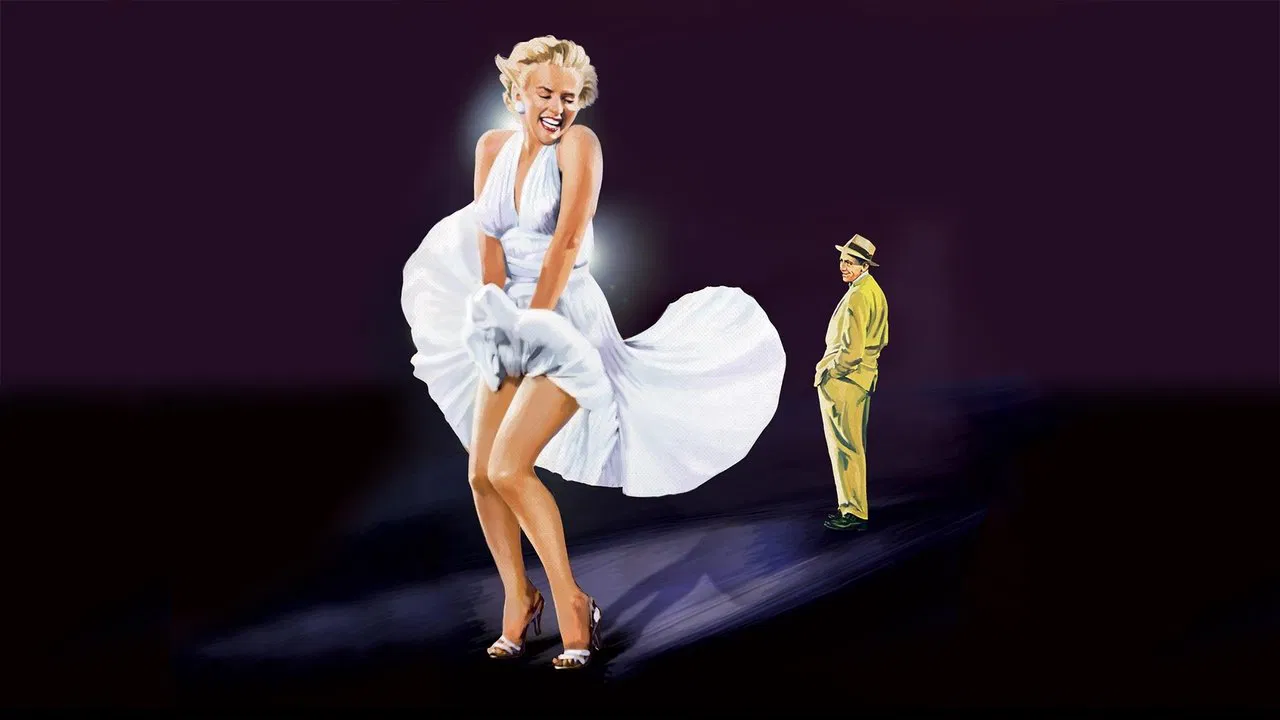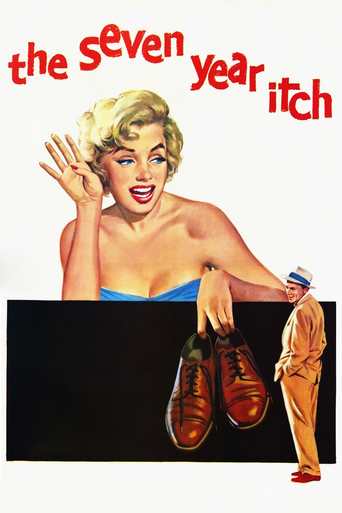

Although it contains one of cinema's most enduring and iconic scenes, The Seven Year Itch is not actually very good. Tom Ewell plays a married man who has the family apartment to himself for the summer, and Marilyn Monroe plays a ditzy blonde who lives upstairs. The plot charts the "will they, won't they?" situation, but hardly anything actually happens.For Monroe fans, it's a poor deal as there is an awful lot of screen time devoted to Tom Ewell delivering extended monologues, which probably worked as a stage play (which this originally was), but gets pretty boring in a movie. This is not really Ewell's fault, he knows how to perform dialogue, but the script is not engaging, as it consists mostly of the character's neurotic musings and guilt about his attractiveness/fidelity/health/the heat/work/smoking, etc. As soon as Monroe is on screen though, she lights it up, but the extent of her dimness is very forced, particularly as Ewell's character is so obviously trying to seduce her, yet she remains unbelievably and steadfastly oblivious to it for nearly all of the running time, while he burbles away via the ever present monologues. Even the skirt blowing scene is disappointing - a real let down when the on screen footage of the situation is compared to the wealth of still photographs that exist of the famous event, because in the movie it's barely even shown.Directed by Billy Wilder, it's nowhere near as smart and sassy as "Some Like It Hot". I think the stage origins drag it down. Town Ewelll is actually the central character, but he fights a losing battle against both the luminous Monroe, and the drivel of his character's dialogue. And for Marilyn Monroe fans, she does provide a textbook dizzy breathy blonde bombshell, but a sharper and wittier script would have made so much more of her.
... View MoreTHE SEVEN YEAR ITCH is a funny comedy that makes fun of goods fidelity in marriage and love madness. The main protagonist is a workaholic who is going through a midlife crisis. Like many husbands in this film, he sends his wife and son out of town on the summer vacation. Regardless of the love madness, which then reigned, he is trying to remain faithful to his wife, healthy habits and his work. Faithful until the hottest blonde rings the bell at his door...This film is a parody stereotype, which is not so bad. She is a stereotypical dumb blonde, but she dominates in every moment. He is the foundation and driving force in his company and he often wanders into the world of his own imagination. This is a comedy where the facts and the challenge are clearly set out. The Seven Year Itch is a fact, regardless of his crisis, raging libido and some anxiety. The challenge is Marilyn Monroe. It's simple. The pandemonium ensues when the main protagonist stops to distinguish fantasy from reality. Tom Ewell as Richard Sherman is extremely fun, especially in moments of self-punishment. His crisis are explosive, but in a farcical way, because he finds meaning in everything. Marilyn Monroe as The Girl is simply dominant. Her acting lacks a little depth, but there are too many fluttering and seduction. This is Mrs. Monroe. Her effort is undeniable. It's a little too hot.This may be adultery, but all is too lukewarm. The film definitely does not leave a strong impression.
... View MoreThis movie probably holds the record for at least two categories I can think of. First, it's got the greatest amount of on screen dialog by a character talking to himself. And secondly, the story references more movie titles than any other picture I can think of. I came up with the following - "Riot in Cell Block 11" (1954); "From Here to Eternity" (1953); "The Picture of Dorian Gray" (1945); and ""Creature From the Black Lagoon" (1954). All but Dorian Gray were relative contemporaries of this one, made within a couple years of "The Seven Year Itch".So I guess the time and place for a picture like this was the 1950's. Along with "Gentlemen Prefer Blondes" (1953) and "Some Like it Hot" (1959), both of which also star Marilyn Monroe, the story telling consisted of libido saturated men salivating over ditzy women and the complications that arise during the chase. Time and tastes would eventually put these kind of pictures out of favor and I guess that's why they have a dated feel to them today. One could make the case that they're chauvinistic to a fault and you wouldn't get much push back from me on that score.But just like the racial references one finds in pictures of the Thirties and Forties when blacks were called 'boy' and Chinese were 'Chinks', it's interesting to see the evolution of society and the movies that reflect those attitudes in each ensuing decade on the big screen. "The Seven Year Itch" is like a movie version of a TV sit-com one might have caught during the era, but with a subject matter a bit too intimidating for family fare.I've never been a big fan of Marilyn Monroe and her film comedies generally leave me feeling ambivalent regarding her talent. The one picture in which she does leave a significant impression is 1961's "The Misfits" where she uses her eyes expressively to reveal the pain of her character. Had her life not been cut short we might have seen more influential work from this actress who's legacy primarily rests on scenes like the one in this picture, skirt billowing in an updraft to reveal the hint of sexuality for which the blonde actress was primarily known.Tom Ewell, with his hilarious facials and discombobulated lack of self confidence is the perfect foil for 'The Girl" in this story. Unable to pull the trigger on his infatuation for the girl upstairs, Richard Sherman (Ewell) represents the Everyman who considers himself a Casanova, but underneath it all, is firmly anchored to the idea of one man, one woman, at least as the institution of marriage existed in the Fifties. An insight into his cluelessness was confirmed when he needed the entire Manhattan phone book to look up the number of his upstairs neighbor.
... View MoreSmack dab in the middle of the Decade of presumed innocence there were cracks in the facade and this is an example. Occasionally there were Artistic displays that penetrated, or at least tried to penetrate, the layer of "Virginity" that coated this most hypocritical of times.Billy Wilder was one of those Visionaries that always seemed to be on the edge of things and here he attempted to say more than the Censors would allow and as a result this was as revealing as a revelatory recital on Sexuality and Mores could be in 1955.Couched in Neurosis and suppressed urges (itches) this broad Sex/Comedy is a dated, ditsy, delight, and is iconic and irresistible for those seeking its less than lewd portrayal of Male Fantasies from the age of agonizing conformity. Marilyn's doe-eyed display of a naive natural beauty and some amusing situations give this a Charming experience that is devoid of the cringe inducing Comedy that passes by today.
... View More